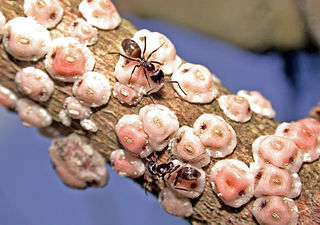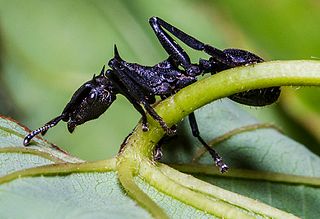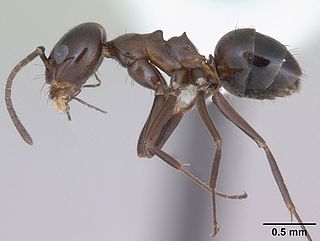
Dolichoderinae is a subfamily of ants, which includes species such as the Argentine ant, the erratic ant, the odorous house ant, and the cone ant. The subfamily presents a great diversity of species throughout the world, distributed in different biogeographic realms, from the Palearctic, Nearctic, Afrotropical region and Malaysia, to the Middle East, Australian, and Neotropical regions.

Dorymyrmex is a genus of ants in the subfamily Dolichoderinae.

Cephalotes is a genus of tree-dwelling ant species from the Americas, commonly known as turtle ants. All appear to be gliding ants, with the ability to "parachute" and steer their fall so as to land back on the tree trunk rather than fall to the ground, which is often flooded.

Crematogaster is an ecologically diverse genus of ants found worldwide, which are characterised by a distinctive heart-shaped gaster (abdomen), which gives them one of their common names, the Saint Valentine ant. Members of this genus are also known as cocktail ants because of their habit of raising their abdomens when alarmed. Most species are arboreal (tree-dwelling). These ants are sometimes known as acrobat ants.

Carebara is a genus of ants in the subfamily Myrmicinae. It is one of the largest myrmicine genera with more than 200 species distributed worldwide in the tropics and the Afrotropical region. Many of them are very tiny cryptic soil and leaf-litter inhabitants. They nest in rotten wood to which the bark is still adherent in the Afrotropical region, or may be lestobiotic nesting near other ant species. Some species are known to exist parasitically within termite nests. Little is known about the biology of the genus, but they are notable for the vast difference in size between queens and workers.

Leptomyrmecini is a tribe of Dolichoderinae ants with 16 genera and two extinct genera.

Dorymyrmex biconis is a species of ant in the genus Dorymyrmex. Described by Forel in 1912, the species is endemic to Colombia and Venezuela.

Dorymyrmex bituber is a species of ant in the genus Dorymyrmex. Described by Felix Santschi in 1916, the species is endemic to Argentina and Paraguay.
Dorymyrmex breviscapis is a species of ant in the genus Dorymyrmex. Described by Forel in 1912, the species is endemic to Argentina.
Dorymyrmex bruchi is a species of ant in the genus Dorymyrmex. Described by Forel in 1912, the species is endemic to Argentina.
Dorymyrmex coniculus is a species of ant in the genus Dorymyrmex. Described by Felix Santschi in 1922, the species is endemic to Argentina.

Dorymyrmex elegans is a species of ant in the genus Dorymyrmex. Described by Trager in 1988, the species is endemic to the United States and Mexico, where it is a nocturnal species and is normally seen on cool days.
Dorymyrmex ensifer is a species of ant in the genus Dorymyrmex. Described by Forel in 1912, the species is endemic to Argentina.

Dorymyrmex exsanguis is a species of ant in the genus Dorymyrmex. Described by Forel in 1912, the species is endemic to Argentina and Paraguay.
Dorymyrmex fusculus is a species of ant in the genus Dorymyrmex. Described by Santschi in 1922, the species is endemic to Argentina.

Dorymyrmex jheringi is a species of ant in the genus Dorymyrmex. Described by Forel in 1912, the species is endemic to Brazil and Paraguay.

Dorymyrmex paranensis is a species of ant in the genus Dorymyrmex. Described by Felix Santschi in 1922, the species is endemic to Paraguay.
Dorymyrmex pulchellus is a species of ant in the genus Dorymyrmex. Described by Felix Santschi in 1922, the species is endemic to Argentina.
Dorymyrmex santschii is a species of ant in the genus Dorymyrmex. Described by Gallardo in 1917, the species is endemic to Argentina.

Dorymyrmex spurius is a species of ant in the genus Dorymyrmex. Described by Felix Santschi in 1929, the species is endemic to Argentina, Brazil, Paraguay and Uruguay.











